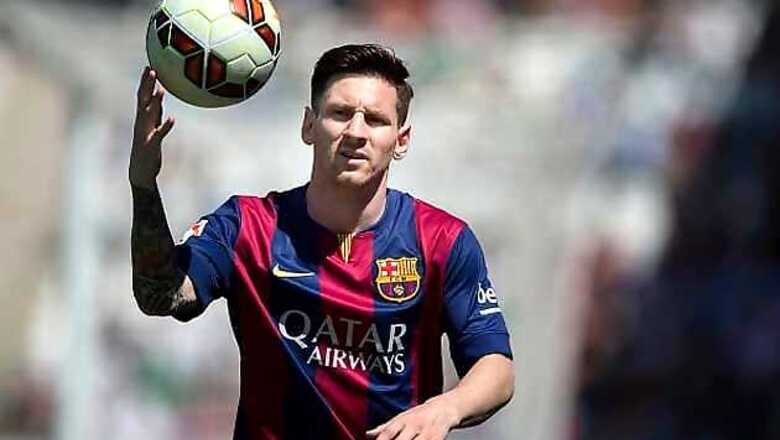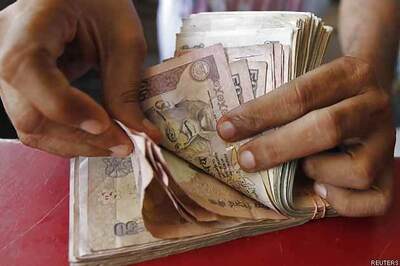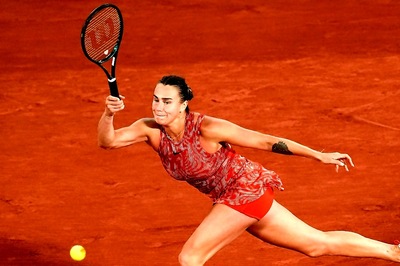
views
Spanish football stars from teams including Barcelona and Real Madrid threatened on Thursday to go on strike from May 16 to demand fairer distribution of riches from television broadcast rights.
Following a threat by Spain's football federation to cancel key end-of-season matches, dozens of players including Barca's Andres Iniesta and Real's Sergio Ramos pledged their backing for the stoppage, at a press conference by the AFE players' union.
The last few games of the season have instead been put into serious doubt because of a spat between Spanish soccer authorities over TV money. At the heart of the issue is how the revenue from a proposed new law will be divided among the top teams in Spain and those in the lower leagues.
The Spanish federation, which runs football in the country but does not control the top two divisions, announced on Wednesday that it would suspend all league and cup games from May 16.
On Thursday, the players' union officially aligned itself with the federation by calling a strike to begin on May 16.
If the stoppage goes ahead, it would affect the final two rounds of the league, and the Copa del Rey final.
Barcelona leads Madrid by two points, and is scheduled to play Athletic Bilbao in the Copa del Rey final on May 30.
Barcelona midfielder Xavi Hernandez and Madrid goalkeeper Iker Casillas appeared with union president Luis Rubiales and other top players to show their backing of the strike on Thursday.
The federation and the players' union are taking the measure against the Spanish league to protest a proposed law on the sale of television rights and how the income is divided. The new deal would give first-division clubs 90 percent of the income, while the union wants more to go to lower divisions.
"We are in favor of the collective sale of the TV rights, but not the new law as it is," Rubiales said. "We ask for a smaller difference between the first and second division like in the rest of Europe."
The federation's complaints go beyond the division of TV revenues to include further revenues generated by state-run betting, and audits by tax officials into nonprofessional clubs.
Hours after the federation said it would suspend play, the Spanish league retaliated by saying it was taking legal measures against the federation.
The league said in a statement that the "decision adopted by the Spanish football federation is legally void," and that it had "taken the corresponding legal actions ... in defense of the legitimate interests of its clubs."
This is the latest, and most serious, confrontation between the leaders of the governing bodies of Spanish soccer.
Angel Maria Villar, the president of the federation since 1988, has repeatedly been at issue with Miguel Cardenal, the president of the Spanish government's higher sports council, and Javier Tebas, the president of the Spanish league, over measures taken to curb violence in stadiums, the auditing of federation finances, and public funding of sports.
And Tebas wasted no time lashing out at Villar on Thursday.
"It's an insane, audacious, and irresponsible act by Angel Maria Villar's institution, which doesn't know what course professional or amateur football should take," Tebas said in defense of the proposed new law. "It's a challenge to the league, and it only corresponds to a personal agenda."
Tebas, as league president, has argued that the new law will be necessary for the league to try to get a similar deal to the one struck in February by the English Premier League worth about 5 billion pounds ($7.4 billion) for the domestic rights alone for 2016-19.
Most Spanish clubs had been pushing for years for the centralized sale of TV rights, which they hope will lead to a more equitable sharing of the revenue. Currently, Madrid and Barcelona strike individual TV deals and take in about 140 million euros ($158 million) each, compared to the next biggest earners with about 40 million euros ($45 million).
The new law, which needs to be approved by parliament, would take effect in 2016.
"The damages are terrible and huge," Tebas said of the strike. "Even in China they are worried about the consequences it can have on our sponsors.
"I ask the government to leave the proposed law as it is and not to touch it. If there is going to be a strike, then so be it. But we won't bow to the federation's blackmail. If the government bows to his irresponsible act of blackmail, it will be a setback to the regeneration of Spanish football."
Cardenal, the government's top sports official, also defended the new law, and said the federation's threatened strike can't be justified.
"I ask the federation to read the law carefully, take time to think, and return to the reasonable work of fostering amateur football," Cardenal said.
The league has called an extraordinary meeting for its 42 first- and second-division clubs on Monday.


















Comments
0 comment